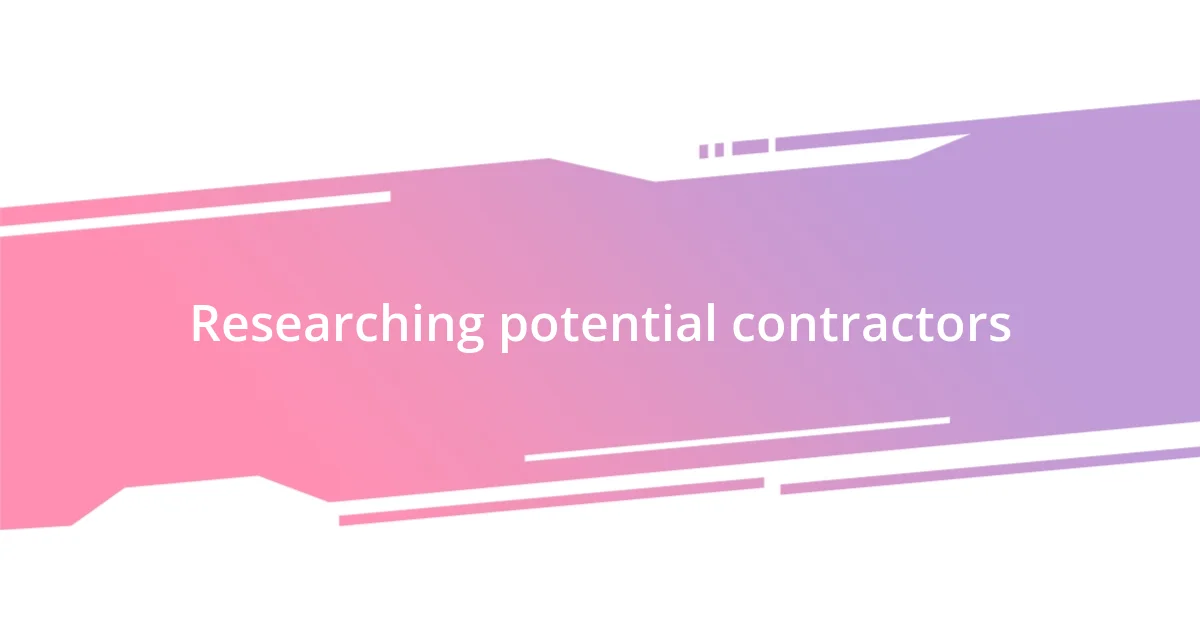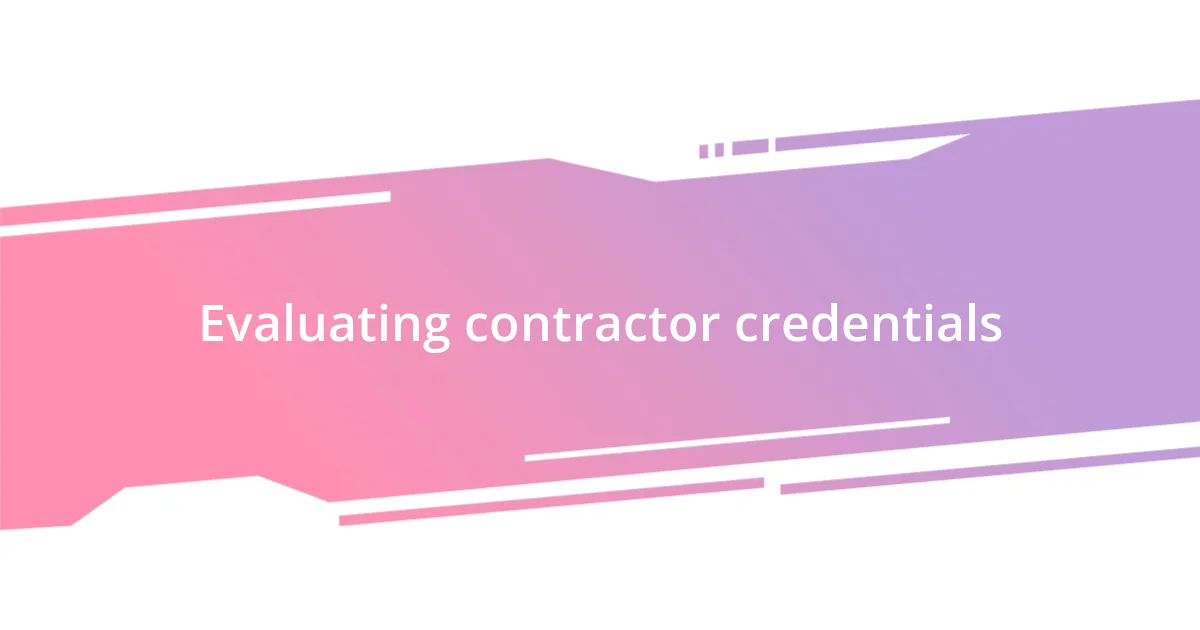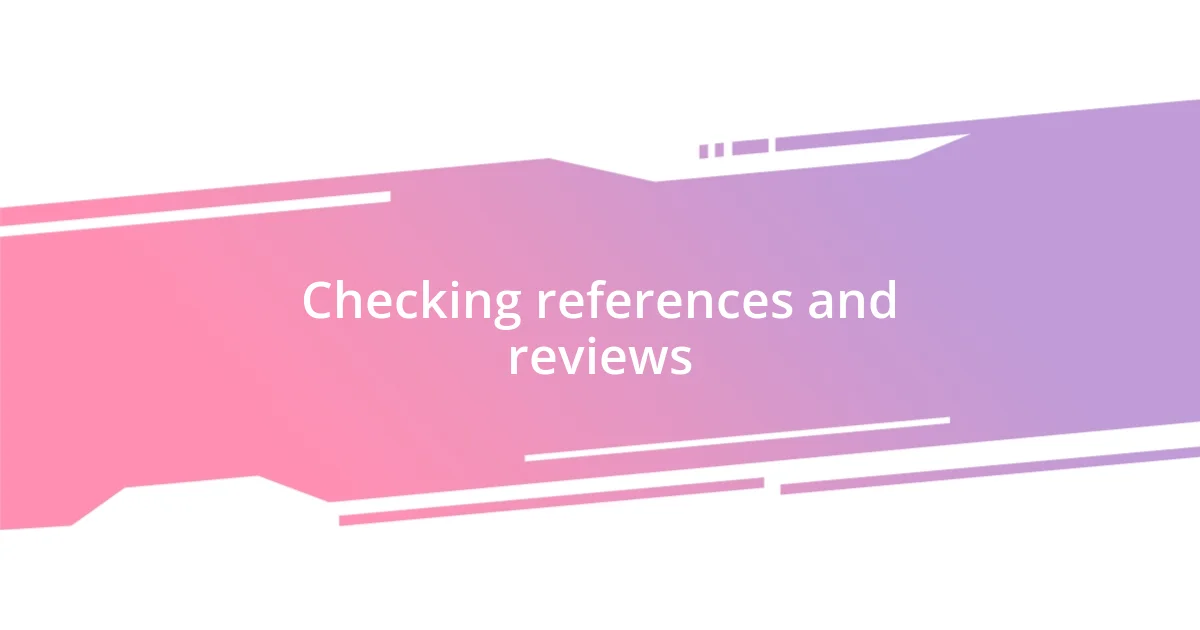Key takeaways:
- Understanding your project needs is essential for effective communication and setting a solid foundation for collaboration with contractors.
- Thoroughly researching contractors—including checking licenses, experience, and client reviews—helps ensure a reliable and qualified choice.
- Asking the right questions during the selection process fosters trust and clarity regarding project expectations and contractor capabilities.

Understanding your project needs
Understanding what you need for your project is crucial. I remember when I first embarked on a home renovation; I was overwhelmed by the choices. I asked myself, “What exactly am I hoping to achieve?” It was important to clarify my vision before anything else.
Breaking down your project into specific requirements can be incredibly revealing. For instance, I once found that simply deciding between a modern or traditional style helped me prioritize my budget effectively. What materials do you envision? Do you want eco-friendly options? These details matter and can streamline the decision-making process.
I often reflect on the importance of communication during this stage. When discussing my ideas with potential contractors, I felt more confident in their expertise once I articulated my needs clearly. It made me wonder, how can one expect to receive accurate estimates or solutions without expressing their vision? Taking the time to understand your project needs isn’t just about making choices; it’s about creating a solid foundation for a successful collaboration.

Researching potential contractors
Researching potential contractors is a crucial next step in the journey I embarked on. I remember scrolling through endless listings, feeling a mix of excitement and anxiety. It can be overwhelming, but I focused on a few key aspects that helped me filter my options effectively.
Here are some important factors to consider during your research:
- Licensing and insurance: Ensure the contractor has the necessary licenses required by your state and carries liability insurance.
- Experience and expertise: Look for contractors who specialize in the kind of work you need. Their experience can make a difference in quality.
- Online reviews and testimonials: I often check platforms like Yelp or Angie’s List to gauge a contractor’s reputation. Reading past clients’ experiences helped me feel more informed.
- Portfolio of past work: Reviewing a contractor’s past projects, I found that visuals often spoke volumes about their capabilities. It’s important to see a style that aligns with your vision.
- Communication style: I valued contractors who responded promptly and clearly. A good contractor-client relationship starts with effective communication.
Taking the time to gather and reflect on this information made a significant difference in my contractor selection process. Each piece of the puzzle helped me feel more confident in my decisions, rather than just locking in the first name I stumbled upon.

Evaluating contractor credentials
When evaluating contractor credentials, I found it essential to dig deeper than just surface-level information. I vividly remember the time I accidentally hired a contractor whose impressive brochure didn’t match their on-the-ground work ethic. This experience taught me that a flashy marketing campaign doesn’t guarantee quality. I started to prioritize contractors with established credentials, such as local licenses and confirmed insurance. These credentials provided me with reassurance of their professionalism and accountability.
As I continued my journey, I looked into additional certifications or specialties that could boost a contractor’s credibility. For instance, a contractor licensed in sustainable construction was particularly appealing when I decided to incorporate green practices into my home. I felt that choosing someone with specialized credentials not only enhanced the project but also aligned perfectly with my personal values. It became clear that credentials are more than just boxes to tick; they reflect a contractor’s dedication and expertise in their field.
One of the most revealing aspects of evaluating contractor credentials for me was the difference between various certifications. For instance, I didn’t realize the importance of a General Contractor vs. a Specialty Contractor until I spoke with a few in-depth. General contractors manage overall projects, while specialty contractors focus on specific trades like electrical or plumbing work. I remember feeling a sense of clarity when I understood exactly who I needed for my project, reinforcing the necessity of this evaluation stage. Are you aware of the specific credentials that can affect your project’s outcome?
| Credential Type | Description |
|---|---|
| General Contractor License | Required to oversee construction projects and ensure compliance with local building codes. |
| Insurance | Covers liability for damages or injuries that may occur during the project. |
| Specialty Certifications | Indicates expertise in specific areas such as electrical or plumbing work. |
| Bonding | Provides protection for clients if the contractor fails to complete the job. |

Asking the right questions
When it came to asking the right questions, I realized that this step could make or break my experience with a contractor. I vividly recall sitting across from one contractor, nervously clutching my notepad filled with queries. I learned to prioritize specific questions, such as their approach to project timelines and how they handle unexpected issues. Those moments of inquiry not only provided clarity but helped establish a level of trust.
Asking about previous projects was another crucial question for me. I remember probing into the specifics of a past renovation they did—how challenges were managed and whether the client was satisfied. Hearing about particular hurdles they overcame revealed their problem-solving capabilities. Have you ever considered how much you can learn from a contractor’s storytelling? It brings their qualifications to life.
I also found it beneficial to understand payment structures and warranty options upfront. Once, a contractor’s contract left me bewildered with hidden costs. I now always ask questions like, “What contingencies are included in the estimate?” and “How do you ensure quality after project completion?” This clarity not only protects you but also builds a collaborative foundation, turning a potentially daunting process into a partnership. Wouldn’t you agree that knowing what to expect from the start can ease any anxiety?

Comparing quotes and proposals
Comparing quotes and proposals was a crucial step in my contractor selection process. I remember laying out several quotes on the dining table, feeling a mix of excitement and apprehension. It was eye-opening to see how vastly different the prices and services were—the lowest didn’t always mean the best value. I learned to examine not just the numbers, but what exactly was included, especially in terms of materials and warranties. Have you ever faced that moment of choice, asking yourself if cheaper really means better?
As I dug deeper, I realized that a thorough comparison went beyond mere costs. I paid close attention to timelines and the scope of work proposed. One contractor had an enticingly low bid but a vague timeline, which made me uneasy. On the other hand, another proposal seemed higher but included a detailed plan of action and guaranteed finish date. It dawned on me that clarity and detail often signal a contractor’s reliability. Have you ever felt that rush of confidence when you finally understood the full scope of what was on offer?
I also discovered the importance of follow-up communication. When I reached out for clarifications, the responsiveness of each contractor spoke volumes. One contractor promptly replied, clarifying the details I was unsure about, while another took days to respond. The contrast in communication styles made it easier for me to choose. It became evident that the right contractor should inspire trust not just through numbers, but in their willingness to engage and provide insight. Don’t you agree that when selecting a contractor, feeling heard is just as vital as understanding their proposals?

Checking references and reviews
I can’t emphasize enough the importance of checking references and reviews before finalizing a contractor. I remember the first time I was about to hire someone for a home renovation. I stumbled upon a review that mentioned significant delays on a project, which made me pause. How much could consistency really matter? After doing my due diligence, I realized that a contractor’s past clients can offer invaluable insights not just about quality, but their professionalism and reliability as well.
When I contacted past clients for references, it became a revealing experience. One homeowner spoke passionately about how a contractor had transformed their space, but also shared a couple of missteps along the way. This honesty gave me a fuller picture—after all, no project is without hiccups. Are you familiar with the term “word of mouth”? It’s still one of the most trusted methods for gauging someone’s reliability in the industry, and it’s heartening to hear real stories that illustrate a contractor’s performance under realistic conditions.
I also made a habit of looking for red flags in online reviews. One contractor I considered had a mix of positive and negative feedback, but what stood out was the contractor’s responses. Did they address concerns professionally, or did they get defensive? When I saw how one contractor engaged directly with reviewers, it reassured me they valued their clients’ experiences. It’s astounding how much you can gauge about a contractor’s character by observing how they handle criticism. Isn’t it fascinating how reviews can reveal not just a contractor’s work, but their integrity too?

Finalizing the contractor choice
Choosing the right contractor requires a careful balancing act of many factors, and finalizing that choice is where everything comes together for me. After all my research, I felt a surge of confidence when I identified the contractor who not only fit my budget but also communicated effectively throughout the process. I recall looking at their proposal one last time and realizing that the detailed breakdown they provided wasn’t just words; it felt like a partnership based on mutual respect. Have you ever experienced that moment when everything just clicks into place?
What surprised me most during this phase was how intuition played a role alongside the facts. As I considered the final options, something about the demeanor of one contractor made them stand out to me. Their enthusiasm for the project was contagious! I vividly remember how they listened intently to my ideas, offering valuable suggestions that built on my vision. It was this personal connection, rather than merely the numbers on the page, that led me to trust them more than the others. Isn’t it intriguing how those gut feelings can sometimes guide our choices?
Ultimately, the final push came when I revisited my priorities. I reflected on timelines, budget, and overall chemistry with each contractor. I even created a simple pros and cons list and found myself favoring the contractor who asked insightful questions rather than just focusing on the price. This little exercise clarified my thoughts and made me realize that the best choice wasn’t merely about the cost but about forming a relationship with someone who would invest in my project as much as I would. Have you ever taken a step back to align your decisions with what truly matters to you?














